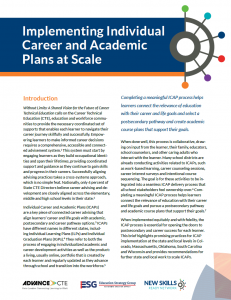When the Oklahoma Department of Education launched Individual Career and Academic Planning (ICAP) in 2017, the intent was to support learners along their entire career journey to make informed choices about their future academic and career goals. Today, ICAP is firmly rooted in policy and practice. Beginning in the 2019-20 school year, learners entering the ninth grade in Oklahoma must complete an ICAP to graduate from a public high school.

What is remarkable about Oklahoma’s ICAP process is that the process supports learners to and through high school graduation, helping them transition to postsecondary education or into the workforce. Learners who enroll at the University of Oklahoma can identify a major by comparing their ICAP personal interest survey results or Career ClustersⓇ survey results from high school with the university’s career pathways major planning tools. Too often, career and academic planning is siloed between secondary and postsecondary education, but Oklahoma is working to break down these silos and ensure ICAP supports learners even after they graduate from high school.
ICAPs have different names in different states, including Individual Learning Plans (ILPs) and Individual Graduation Plans (IGPs). They refer to both the process of engaging in individualized academic and career development activities as well as the product: a living, usually online, portfolio that is created by each learner and regularly updated as they advance through school and transition into the workforce.
While ICAPs have been adopted by at least 38 states, they are often layered on top of the myriad other commitments that under-resourced and under-staffed schools and districts are responsible for, making them more of a box-check activity than a meaningful career planning process. When implemented with fidelity, ICAPs can enable learners to skillfully navigate their own career journeys and build occupational identities that span their lifetimes. State leaders play a critical role in ensuring that ICAPs are implemented effectively, that academic and career planning is integrated into state-level initiatives, and that each learner is provided coordinated supports to help them navigate their career journey. Specifically, state leaders can support ICAP implementation by:
- Integrating ICAPs into their career pathways systems, using the planning process to help learners identify and pursue work-based learning and early college experiences that are aligned to their career interests.
- Taking a system-wide approach to implementing ICAPs and ensuring each learner has access to a caring adult — whether they are a school counselor, a teacher, an administrator or a community member — who can guide their academic and career planning.
- Building local capacity to support school ICAP delivery by providing tools, resources and funding to ensure local leaders can implement ICAP successfully.
- Leveraging ICAPs to support learner transitions and designing tools and processes that seamlessly connect and transfer from secondary to postsecondary education.
- Ensuring equity in ICAP implementation by monitoring disaggregated data and ensuring the planning process is customized to address the specific needs of learners who have been historically marginalized.
Advance CTE and Education Strategy Group’s new resource, Implementing Individual Career and Academic Plans at Scale, highlights promising practices for ICAP implementation at the state and local levels and provides recommendations for further state and local work to scale ICAPs. The brief features promising state and local practices in Colorado, Massachusetts, Oklahoma, South Carolina and Wisconsin. It was developed through JPMorgan Chase & Co.’s New Skills ready network, a partnership of Advance CTE and Education Strategy Group. For more resources on career advisement, visit the Learning that Works Resource Center.
Austin Estes, Manager of Data & Research
